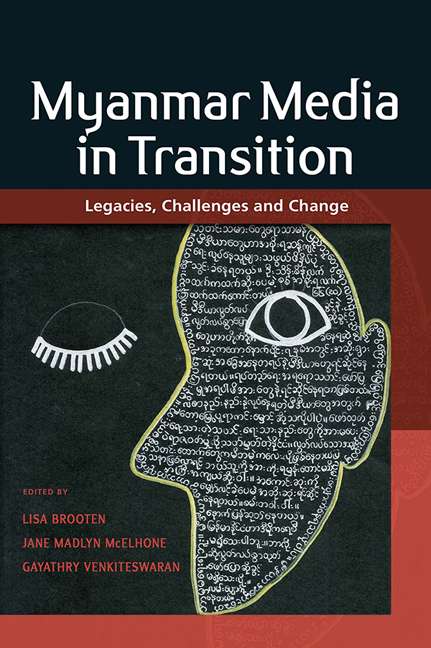Book contents
- Frontmatter
- Contents
- Contributors and Editors
- Burma or Myanmar? A Note on Terminology
- 1 Introduction: Myanmar Media Historically and the Challenges of Transition
- Part I Structural Constraints and Opportunities
- Part II Journalism in Transition
- 6 Silencing a Snakehead Fish: A Case Study in Local Media, Rural-Based Activism, and Defamation Litigation in outhern Myanmar
- 7 Precarity and Risk in Myanmar's Media: A Longitudinal Analysis of Natural Disaster Coverage by The Irrawaddy
- 8 Educating a New Generation of Watchdogs: Interview with Ye Naing Moe, Director of the Yangon and Mandalay Journalism Schools
- 9 The Metamorphosis of Media in Myanmar's Ethnic States
- 10 Covering Rakhine: Journalism, Conflict and Identity
- 11 Media in Myanmar: Laws, Military and the Public
- 12 Cracking The Glass Ceiling in Myanmar Media
- 13 Media and the 2015 General Elections
- Part III Creative Expression
- Part IV Society and Media
- Epilogue: Media Studies in Myanmar – Where Do We Go from Here?
- Index
9 - The Metamorphosis of Media in Myanmar's Ethnic States
from Part II - Journalism in Transition
Published online by Cambridge University Press: 07 September 2019
- Frontmatter
- Contents
- Contributors and Editors
- Burma or Myanmar? A Note on Terminology
- 1 Introduction: Myanmar Media Historically and the Challenges of Transition
- Part I Structural Constraints and Opportunities
- Part II Journalism in Transition
- 6 Silencing a Snakehead Fish: A Case Study in Local Media, Rural-Based Activism, and Defamation Litigation in outhern Myanmar
- 7 Precarity and Risk in Myanmar's Media: A Longitudinal Analysis of Natural Disaster Coverage by The Irrawaddy
- 8 Educating a New Generation of Watchdogs: Interview with Ye Naing Moe, Director of the Yangon and Mandalay Journalism Schools
- 9 The Metamorphosis of Media in Myanmar's Ethnic States
- 10 Covering Rakhine: Journalism, Conflict and Identity
- 11 Media in Myanmar: Laws, Military and the Public
- 12 Cracking The Glass Ceiling in Myanmar Media
- 13 Media and the 2015 General Elections
- Part III Creative Expression
- Part IV Society and Media
- Epilogue: Media Studies in Myanmar – Where Do We Go from Here?
- Index
Summary
In September 2017, editors from the ethnic media network Burma News International (BNI) gathered for a closed-door meeting in Hpa-An, Kayin State to discuss the fresh outbreak of violence in northern Rakhine and the impact on its network. Its Rakhine Buddhist member Narinjara News attended the meeting. Its Rohingya Muslim member Kaladan Press did not. One year later, in September 2018, there are no stories by Kaladan Press on BNI's website. In the current environment, being the only network in Myanmar with a Rohingya member is challenging and contentious.
The Rakhine crisis presents one of the most complex dilemmas BNI has faced during its fifteen-year history. Tensions surfaced with the first wave of anti-Muslim violence in June 2012, in the early days of the political transition. BNI's editor-in-charge, a Buddhist from Rakhine State, decided to stop posting stories from Kaladan Press on the network's news site. This unilateral move silenced the voice of the Rohingya member at a vital time and ensured that only the Rakhine member was heard. This was an abrupt wake-up call for the BNI leadership, already struggling to comprehend the political changes unfolding inside the country. To mitigate a potentially volatile internal crisis — and to create breathing space to evaluate the network's coverage of the anti-Muslim violence — a moratorium was placed on stories from both members.
The tensions did not stop there. In 2016, at BNI's annual ethnic media conference — held for the very first time in Rakhine State, in the historic town of Mrauk Oo — the Rohingya camps and the conflict were the elephant in the room, absent from the conference agenda. Kaladan Press was also absent. A group of Rakhine media outlets had made it clear that they would boycott the conference if BNI's Rohingya member attended, and there were concerns that the Rohingya editor would not be safe if he tried to cross the border from Bangladesh. One of the local Rakhine outlets, Root Investigative Agency — known for its coverage of the Rohingya plight — was also absent.
In August 2017, when violence again flared in northern Rakhine, BNI was once more confronted by its internal membership struggles. Once again, the leadership placed a moratorium on stories from its Rakhine and Rohingya members and endeavoured to calm tensions.
- Type
- Chapter
- Information
- Myanmar Media in TransitionLegacies, Challenges and Change, pp. 210 - 228Publisher: ISEAS–Yusof Ishak InstitutePrint publication year: 2019



